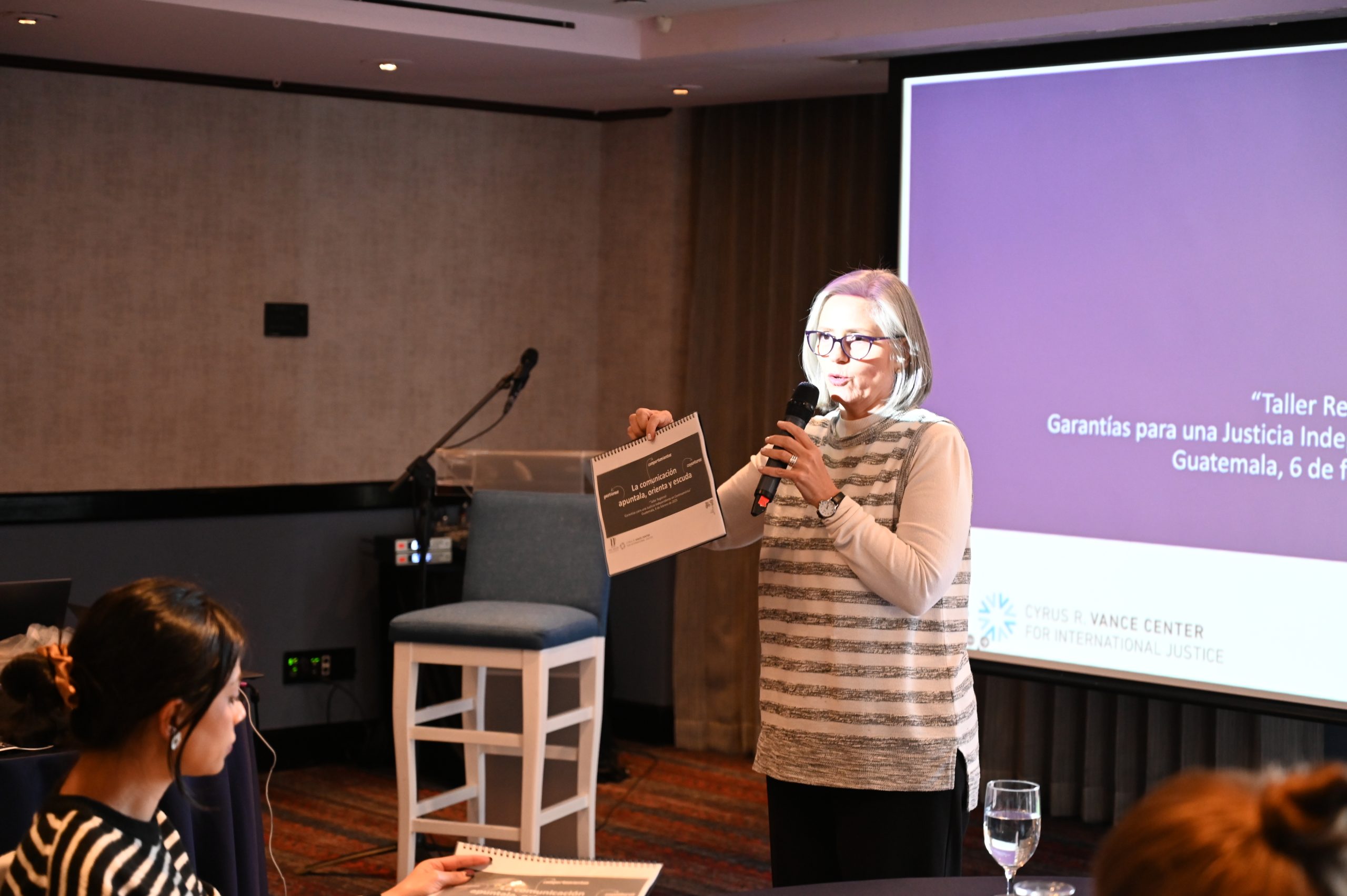This website uses cookies so that we can provide you with the best user experience possible. Cookie information is stored in your browser and performs functions such as recognising you when you return to our website and helping our team to understand which sections of the website you find most interesting and useful.
Vance Center Supports Regional Dialogue on Judicial Independence in Central America
February 2025The Vance Center co-hosted a two-day workshop in Guatemala for judges and legal experts from across Central America.
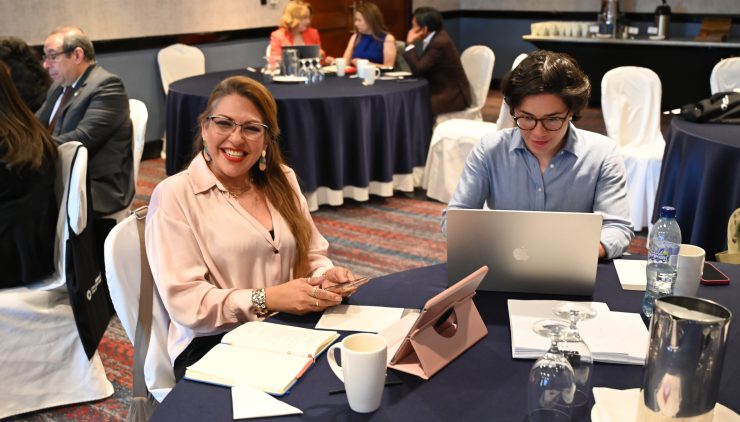
Participants in the workshop in Guatemala City, February 5-6, 2025. Photo credit: Vance Center.
On February 5-6, the Vance Center and the Central American Federation of Judges for Democracy (FECAJUD) organized a workshop to foster greater regional dialogue on international protections for judicial independence, digital justice, accessible legal language, and effective judicial communication.
The two-day workshop, “Guarantees for an Independent Judiciary,” gathered judges, legal experts, and judicial association leaders from across the region in Guatemala City to strengthen knowledge and collaboration on key issues affecting judicial independence and integrity in Central America.

Day One: Regional Cooperation and Technological Innovation
In their opening remarks, FECAJUD President Haroldo Vásquez and Vance Center Associate Executive Director Jaime Chávez Alor emphasized the urgent need for regional cooperation to safeguard judicial independence and rule of law across the Americas.
The first session, “International Mechanisms for Protecting Judicial Independence,” featured Arturo Guerrero Zazueta, Director General of Human Rights, Gender Equality, and International Affairs of Mexico’s Federal Judiciary Council. He discussed the relevant international human rights standards on judicial independence and explored legal mechanisms available to protect judges facing threats or interference.
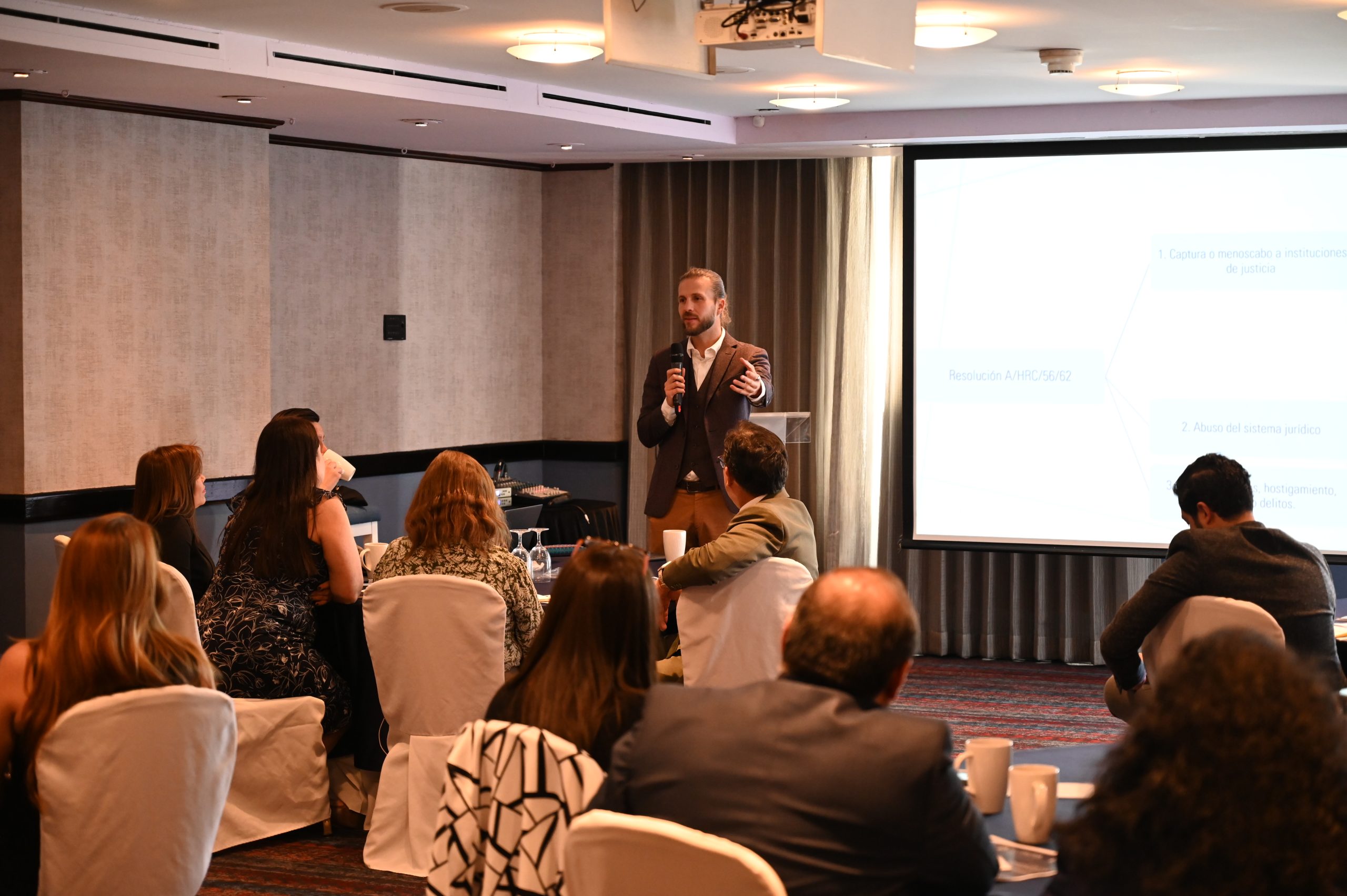
Guerrero Zazueta remarked how judicial independence requires three fundamental guarantees: rigorous appointment procedures, security of tenure, and protection against internal and external pressures, and noted that judicial appointments should be based on merit, qualifications, and equal opportunities. He emphasized the need for judicial careers to be part of a stable, merit-based civil service system. Guarantees for tenure including permanence in office, a clear promotion system, and protection against arbitrary removal, help ensure stability in the judiciary, he said. He raised concerns that restrictions, influences, threats, or improper interference with judges’ work undermines their independence, while a lack of job security and imposition of unjustified sanctions create fear and hinder judicial independence, weakening the separation of powers and the rule of law.
Chávez Alor then introduced the latest update to the Vance Center’s Manual for the International Protection of Judicial Independence. This manual, produced by the Vance Center and FECAJUD, provides a practical guide to help judges access these mechanisms and draft effective requests for international protection.
Dr. Laurence Pantin, a Mexico-based expert on transparency and judicial systems, led the second session, “Digital Justice: Strengthening Legitimacy and Efficiency.” Dr. Pantin addressed the impact of technology on access to justice and the need for a planned digital transformation within the judicial system. She noted that more than 5.1 billion people worldwide lack access to justice, and highlighted how the COVID-19 pandemic further widened this gap, as judicial systems adopted technological tools in state of emergency, without a clear strategy for digital transformation.
Despite these challenges, Pantin pointed out opportunities to rethink how judicial systems function, promoting a more structured and sustainable approach to implementing technological solutions to make judicial processes more efficient, expand access to justice and improve transparency, fostering greater public trust.
Session organizers then led a participatory workshop with judges to encourage them to create innovative digital justice projects. In working groups, attendees brainstormed potential ideas, then selected one to develop further by defining specific objectives and goals. This collaborative activity helped generate concrete and viable strategies to improve efficiency and access to justice through technology.
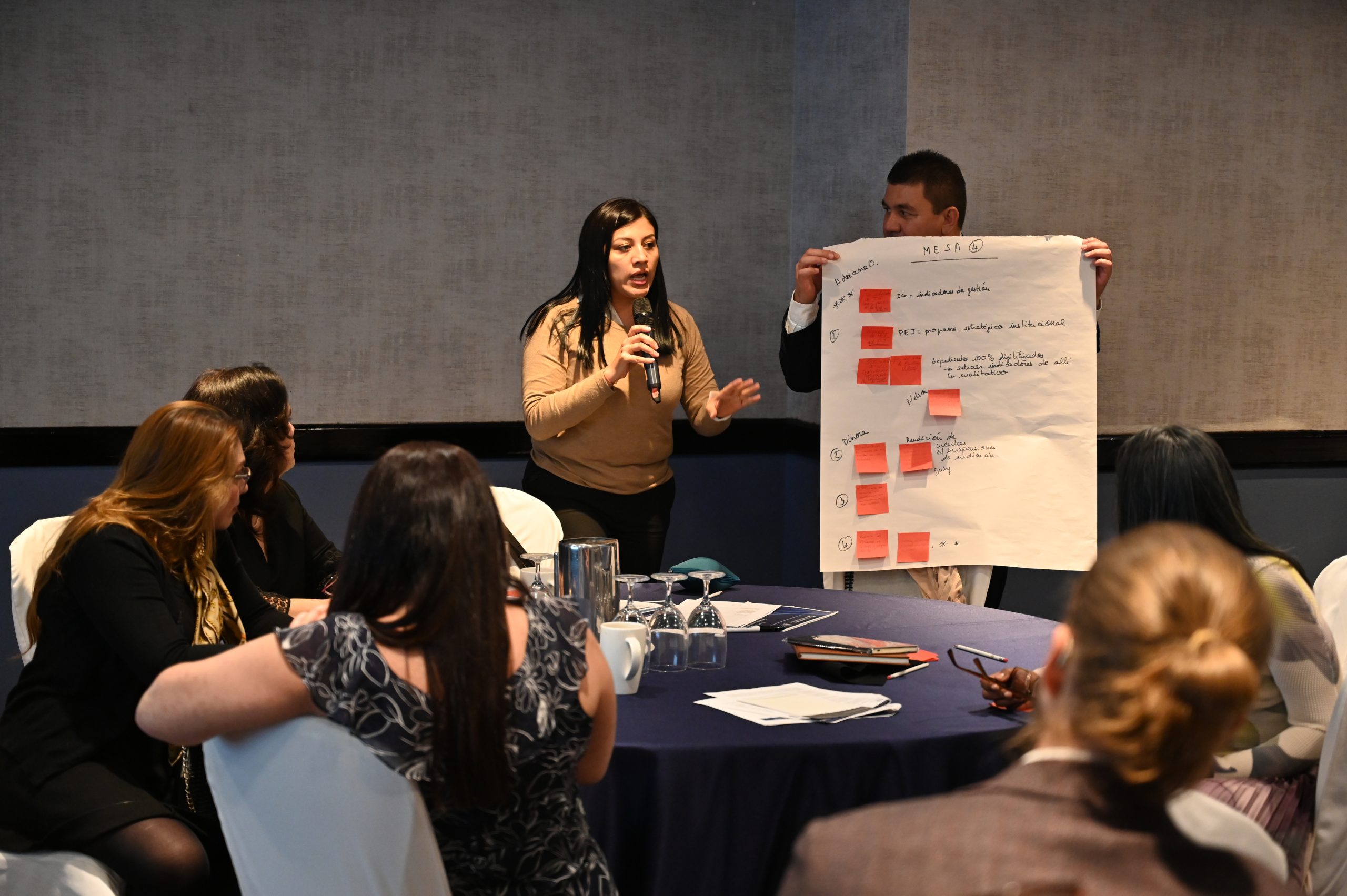
Day Two: Improving Public Trust and Effective Communication
The second day of the workshop focused on strategies to improve public trust in the judiciary.
Judge Juan Jaime González Varas from Mexico led the first session, “Plain-Language Judgments and Legitimacy with Society.” He highlighted the importance of drafting clear, accessible judicial decisions that facilitate the public’s understanding of legal rulings.
Judge González Varas explained that plain-language judgments serve as a tool to make written information more accessible, especially for individuals with reading comprehension challenges or different kinds of disabilities. He stressed that legal decisions should not assume prior knowledge of the judicial system. To make these decisions more relevant and easier to understand, judges should frame them in a way that relates to people’s daily lives, communities, and interests.
Judge González Varas introduced Sor Juana, an artificial intelligence (AI) tool developed by the Mexican Supreme Court (SCJN). The Court created this platform to enhance public understanding of judicial processes by allowing users to ask questions about pending judicial rulings in simple and accessible language. Built with a proprietary algorithm, Sor Juana provides definitions of legal terms, explanations of court decisions, and suggestions for further research, helping to make judicial information more transparent and user-friendly.
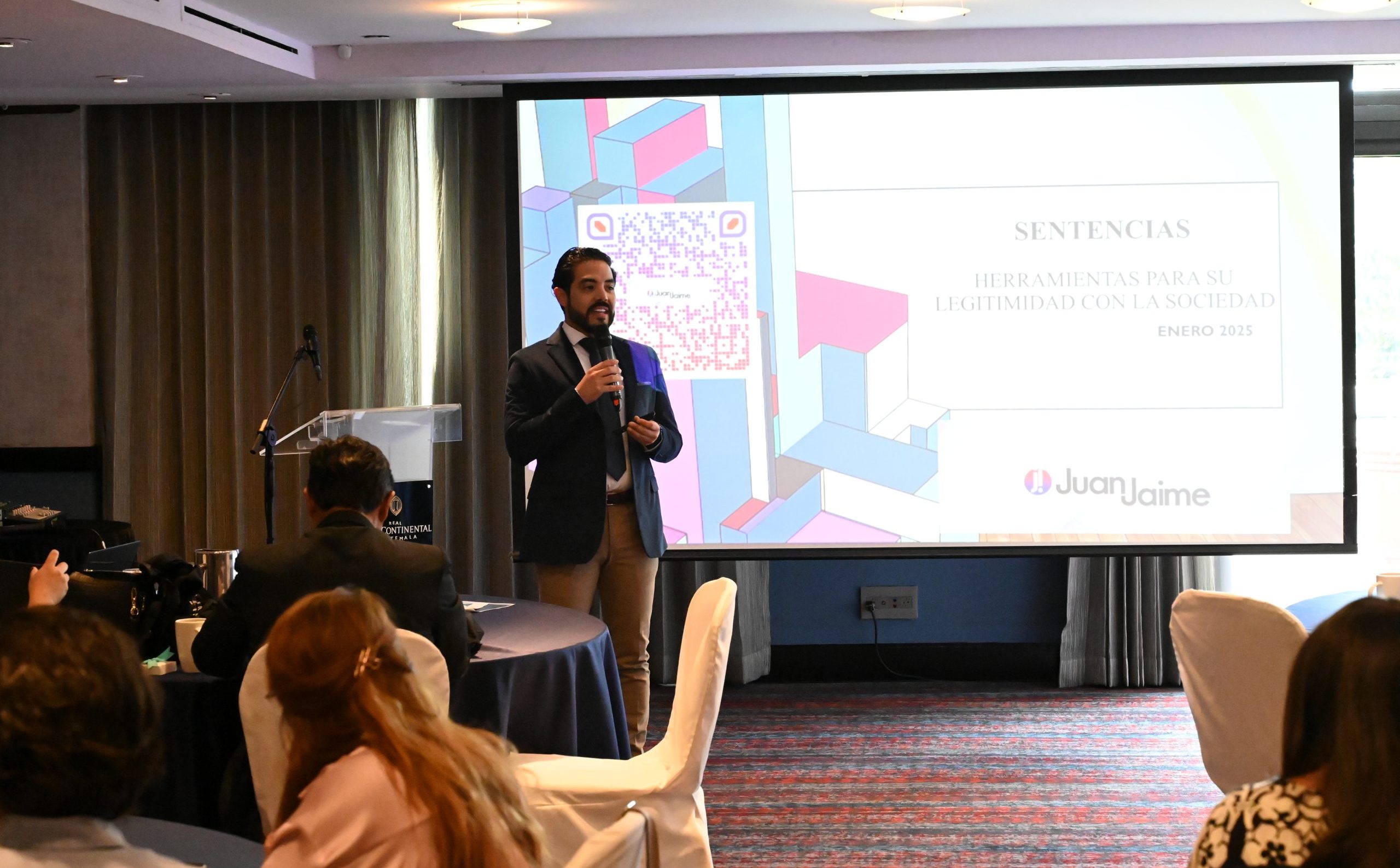
The Vance Center also presented the recently published Guide to International Standards & Comparative Analysis of the Regulation and Implementation of ‘Easy-to-Read’ Judgments, a key resource in the organization’s ongoing efforts to promote access to justice, equality, citizen participation, and trust in the judicial system. The guide, available in English and Spanish, was developed in collaboration with Davis Polk & Wardwell LLP and builds upon the Vance Center’s extensive work with judges’ associations to encourage more accessible judicial practices.
The final session, “Effective Communication for Judicial Associations,” featured strategic communications expert Dr. Fátima Fernández. The discussion highlighted the need for judges to understand how to use communications tools to inform the public about their work, reinforce institutional credibility, and foster public trust. Dr. Fernández offered recommendations on best practices for judicial communication, public engagement, and transparency, and emphasized the need for proactive strategies to navigate political challenges while upholding judicial independence.
The workshop reinforced the critical role of regional and international cooperation in strengthening judicial independence in Latin America. The discussions underscored the need for effective legal protections, innovative digital tools, and clear communication strategies to strengthen public confidence in the judiciary, and set a foundation for future collaboration and innovation throughout the region’s judicial community.
